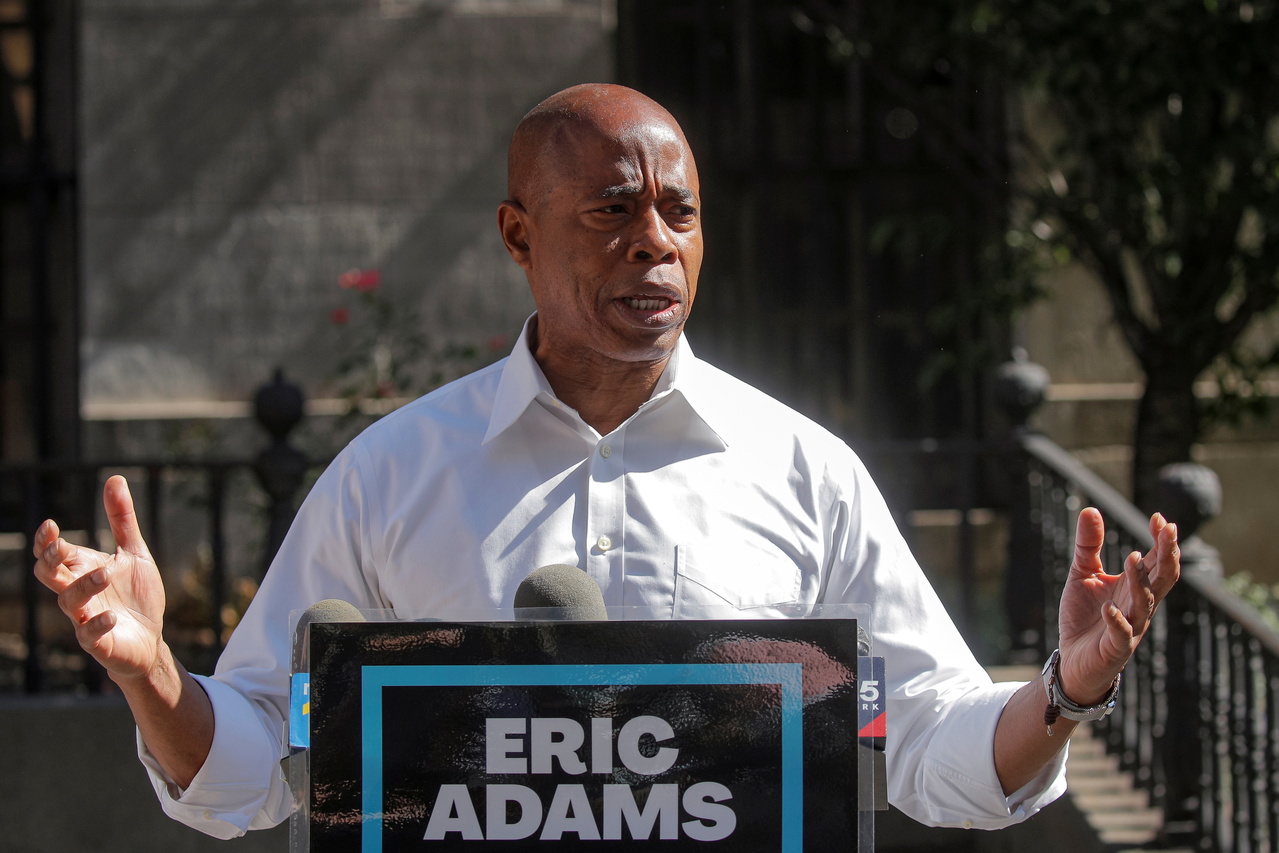New York City removes mayor primary election results after test ballots counted in error
Sign up now: Get ST's newsletters delivered to your inbox

Those results showed Mr Eric Adams holding a 2-point lead over Ms Kathryn Garcia.
PHOTO: REUTERS
NEW YORK (BLOOMBERG) - The New York City Board of Elections took down previously reported results in the Democratic mayoral primary after mistakenly counting test ballots alongside election night results, producing about 135,000 so-called dummy ballots that skewed results.
Those inaccurate results could have contributed to what looked like a surge of support for former city Sanitation Commissioner Kathryn Garcia in results posted on Tuesday (June 29) that showed her narrowing the gap with front runner Brooklyn Borough President Eric Adams.
"Board staff has removed all test ballot images from the system," the board said in a statement posted on Twitter late on Tuesday night. "The board apologises for the error."
Earlier on Tuesday, the board posted results of the ranked-choice of Election Day and early votes. Those results showed Mr Adams holding a two-point lead over Ms Garcia. Mr Adams' lead had tightened dramatically in the second posting of results - so much so, that he issued a statement saying he was questioning the count.
Questions also arose over why the board said around 800,000 ballots were cast in early voting and on Election Day last week, but suggested there were 942,000 ballots in Tuesday's tally.
On election night, Mr Adams had a lead of 75,512 votes in first-choice balloting. But after transferring votes for eliminated candidates in the incorrect tally released on Tuesday, his lead appeared to have tightened to just 15,908 votes.
'Serious Questions'
Mr Adams said in a statement that the new numbers "raised serious questions" and that his campaign was seeking answers from the Board of Elections to explain why Tuesday's vote total was nearly 142,000 ballots higher than last week's totals.
Civil rights lawyer Maya Wiley, the favourite of national progressives, had been in second place until the last round of ranked-choice counting on Tuesday. Ms Garcia appeared to overtake her by just 3,806 votes in ranked-choice voting results released Tuesday, which showed Mr Adams ranked just higher in voter preferences than his opponents.
New York City is using the ranked-choice system of voting for the first time in a mayor's race, allowing primary voters to select their five favourite candidates in order and have their backup choices count if their top picks are eliminated.
"We remain confident that Eric Adams will be the next mayor of New York because he put together a historic five-borough working-class coalition of New Yorkers to make our city a safer, fairer, more affordable place," the campaign said in a statement.
Mr Adams would be the second Black man to lead the US's most populous city. Ms Garcia would be the first woman.
Regardless of the inaccurate results, which the board said it would repost on Wednesday, the order of the finish could still change because 125,000 absentee ballots yet to be counted. This week's results are meant to show only who would have won the election if absentee ballots are not included.
Ms Wiley and Ms Garcia have each said they intend to remain in the race until the calculations are complete. The latest that would be is July 12, city officials have said.
"There's still a lot of votes still out there," said Ms Garcia at a press conference on Tuesday. "There's 124,000-plus votes still out and we need to make sure those all get counted."
Ms Wiley, in an e-mailed statement, said "we must allow the democratic process to continue and count every vote so that New Yorkers have faith in our democracy and government. And we must all support its results".
The candidate who placed fourth in the mayor's race last week, former Democratic presidential candidate Andrew Yang, conceded last Tuesday when he received 11.7 per cent of the first-choice vote.
The outstanding absentee ballots, which will not be counted until July 6, are likely to favour Mr Adams: 44 per cent came from state Assembly districts where he led in the early and election-day voting, compared to 32 per cent from Garcia-led districts.
The winner of the Democratic primary for mayor will face Republican nominee Curtis Sliwa in the November election, but is heavily favoured to win in the overwhelmingly Democratic city.
Mr Adams, a former New York Police Department captain, built strong support across the city by campaigning as a law-and-order candidate who had also survived a police beating as a teen arrested for criminal trespassing.
He opposed calls to cut police budget funding and advocated the return of some form of stop-and-frisk as well as a plainclothes anti-crime task force, both of which were accused of disproportionately targeting men of colour.
In early voting and on Election Day, Mr Adams carried Republican-heavy Staten Island as well as the outer boroughs of Brooklyn and the Bronx as the city endures a sharp rise in shootings and a doubling of hate crimes in the last year.
Ms Wiley, a former counsel to term-limited Mayor Bill de Blasio, received national support from progressive figures eager for a win at the ballot box. But she took criticism for paying for a private security force in her neighbourhood, while calling for police budget cuts.
Ms Garcia was seen as a competent manager with city experience and did well among voters eager to see a non-ideological candidate lead the city.


